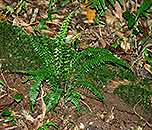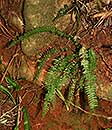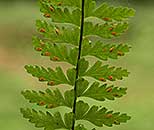Synonyms |
Asplenium erectum Bory ex Willd. var. usambarense (Hieron.) Schelpe
Asplenium sphenolobium (Kunze) Hieron. var. usambarense Hieron.
Asplenium usambarense (Hieron.) Hieron.
Asplenium zeyheri Pappe & Rawson
Asplenium lunulatum Sw. var. erectum (Bory ex Willd.) Sim
Asplenium quintasii Gandog.
|
Common name |
|
Description |
Rhizome erect, up to 13 mm thick; rhizome scales dark brown, entire to subentire, apex tapering to a point, up to 7 mm long. Fronds not proliferous, tufted, erect to arching.
Stipe subglabrous with sparse scales towards the base, up to 12 cm long, matt-grey-brown, with narrow green wings in the upper half.
Lamina variable, light to dark green, 12-40 cm × 1.8-5 cm, narrowly elliptic in outline, pinnate to 2-pinnatifid with decrescent basal pinnae. Pinnae variable, up to 3 × 1 cm, up to 30-45 pairs, shortly petiolate, margins irregularly toothed-lobed, incised less than 1/2 way to the midrib, midrib forming the lower margin of the pinnae for some distance, apex rounded to pointed, basal acroscopic lobe well developed and free, glabrous. Rhachis dark matt-grey to black with 2 narrow green wings, hairless.
Sori 6-15, linear to oval in outline, 1-5 mm long, set at an acute angle on both sides of the costa; indusium membranous,narrowly oblong, entire.
|
Notes | Differs from similar species by having 6-15 sori per pinna, reduced pinnae towards lamina base, not proliferous fronds.
Some autors recognize 2 varieties: var. erectum, which is narrowly oblong in outline and the basal auricle of the lower pinnae is not free, and var. usambarense , which is linear in outline and has a free basal auricle. |
|---|
Derivation | erectum: erect, upright; although the larger fronds are often arching.
|
|---|
Habitat | In deep shade on forest floor of evergreen forest.
|
|---|
Distribution worldwide | Africa, Madagascar, Mascarene Is. |
|---|
Distribution in Africa |
Burundi, Cameroon, Dem. Republic of Congo, Equatorial Guinea (incl. Bioko), Ethiopia, Ghana, Guinea, Kenya, Liberia, Malawi, Mozambique, Nigeria, Rwanda, South Africa, Sudan and South Sudan, Swaziland, Tanzania , Uganda, Zambia, Zimbabwe. |
Growth form |
Epiphytic, terrestrial. |
Literature |
Beentje, H.J. (2008) Aspleniaceae.Flora of Tropical East Africa, Pages 29 - 31. (Includes a picture).
Burrows, J.E. (1990) Southern African Ferns and Fern Allies. Frandsen, Sandton. Pages 223 - 224. (Includes a picture).
Crouch, N.R., Klopper, R.R., Burrows, J.E. & Burrows, S.M. (2011) Ferns of Southern Africa, A comprehensive guide. Struik Nature. Pages 606 - 607. (Includes a picture).
Fisher E. & Killmann D. (2008) Illustrated Field guide to the Plants of Nyungwe National Park Rwanda. University of Koblenz-Landau. Pages 72 - 73. (Includes a picture).
Fisher E. & Lobin W. (2024) Checklist of Lycopodiopsida (clubmosses and quillworts) and Polypodiopsida (ferns) of Rwanda.Willdenowia, 53 Page 156.
Fisher, E. & Lobin, W. (2023) Synoptic Revision of Aspleniaceae (Asplenium, Hymenasplenium) of Rwanda.Phytotaxa, 608 (1) Page 17.
Jacobsen, W.B.G. (1983) The Ferns and Fern Allies of Southern Africa. Butterworths, Durban and Pretoria. Pages 345 - 349. A. erectum and A. zeyheri considered as 2 different species. (Includes a picture).
Kornas, J. (1979) Distribution and ecology of the Pteridophytes in Zambia. Polska Akademia Nauk Wydzial II Nauk Biologicznych. Page 98.
Ntore, S. & al. (2024) Checklist of the vascular plants of Burundi. Meise Botanic Garden. Page 28.
Roux, J.P. (2009) Synopsis of the Lycopodiophyta and Pteridophyta of Africa, Madagascar and neighbouring islands. Strelitzia 23, South African National Biodiversity Institute, Pretoria. Pages 84 - 85.
Roux, J.P. (2001) Conspectus of Southern African Pteridophyta.Southern African Botanical Diversity Network Report, 13 Page 164. (Includes a picture).
Schelpe, E.A.C.L.E. (1970) Pteridophyta.Flora Zambesiaca, 0 Pages 175 - 176. (Includes a picture).
Tardieu-Blot, M.-L. (1964) Ptéridophytes vol.3.Flore du Cameroun, Page 198. (Includes a picture).
|



